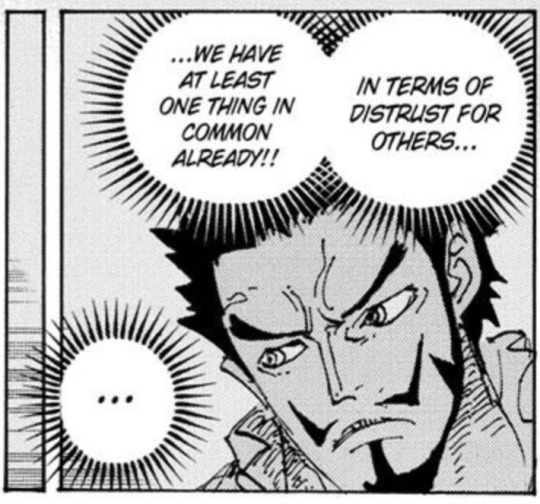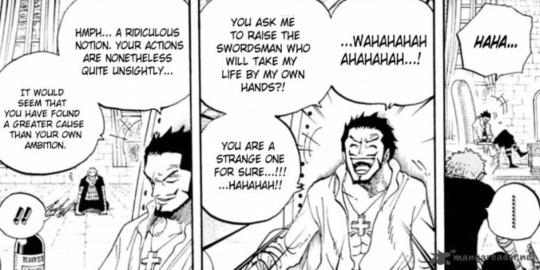#maybe I’ll write mishanks someday HAHA
Text
A Not So Brief Analysis Of Dracule Mihawk

Wondering if Mihawk's distrust of others correlates with the fact he is basically a one-man crew. Wondering just how self-reliable he must've become in order to be self-sufficient. Wondering what is the cause behind it all.
I wonder if, similarly, he has trouble being vulnerable around others. There is an undeniably stoic attribute to his character, but there is a common pitfall practitioners of stoicism (or those who lean towards it) are susceptible to: emotional disregard under the guise of control of emotions, or even worse, reprimanding empathy.
Therefore, could it be the case Mihawk is emotionally detached? It would be easy to draw such a conclusion with what little we’ve been shown of him. While an individualist, he accepts those who come to/at him (Zoro and Perona), and he reaches out to others (Shanks); it might be true that he’d lost interest in Shanks after his injury, but he still committed the sweet act of showing him Luffy’s bounty and apologizing to him upon testing Luffy. There’s also the moment where he tells Perona to take care, upon her departure. So, while aloof, Mihawk is not reserved to the point of stoic cold. He wouldn’t sacrifice company in order to be alone (even if in the case of his pact with Crocodile, there was an utilitarian aspect to the choice; in keeping Perona and Zoro, and in visiting Shanks, there was none other than being nice). One could attribute these acts to an emotional attachment because it does take a drive to complete these very active feats. For Shanks, it could be respect, too. I don’t believe the detached attitude Mihawk possesses would let him take care of those two for two years, especially since he values peace so much; something had to override this desire for peace. I say, the reason could be empathetic in its roots.
Perhaps his self-reliance is misread as distrust? To distrust someone would imply that one is uncertain of their motivations/actions. Mihawk, as someone with Observation Haki, someone who views his enemies with curiosity, who allies himself with whoever is willing to offer him the most peaceful residence… would he be so distrusting? In the little glimpses of his internal monologue we get, there is no distrust and no hesitation. In general, he is confident in his judgement.
But on a more personal level, does he fear his more delicate feelings would be betrayed, if shown too much? There is a possibility for that. We haven’t seen him in such state, as he does rely on himself only. Perhaps Crocodile knows of it. On the flipside, this would imply that Mihawk has a deep, unburied emotional core, one he nurtures and protects – and perhaps one that was taken advantage of. Observation Haki can’t save him from heartbreak, can it? It can sense the emotions of others. It can’t predict his own.
In either case, there very likely is a softer core to the world’s strongest swordsman. Establishing that he isn’t emotionally exempt, but knowing that there’s still a strong individualist quality to him, I wish to look at more of Mihawk’s internal processing.
For an arguably isolated character, he isn't close-minded at all. He possesses curiosity towards his foes; he asks, and he indulges, and he encourages. Think of the entirety of his fight with Zoro.
Then, later on, he is more than anything amused at Zoro’s request. But he obliges. Have the rare panel where he laughs.

When he assesses the strengths of his opponents, he doesn’t do so with any negativity in his mind. Oddly, he goes great lengths to assess them (thinking of his encounter with Luffy). Imagine, it was worth disturbing his peace! Linked here are several reasons why he might’ve done so.
One thing all of these cases have in common is ease. One could argue that it stems from absolute confidence that he is unbeatable, therefore he acts out of boredom, but then again… he trains Zoro because he recognizes valiant traits in him, not because he has nothing better to do. While, yes, there might be some boredom in his life...
Could boredom be Mihawk’s internal motivator? Can we classify his actions as so random/pointless that they serve a sort of entertainment to his otherwise dull living? Personally, I don’t gravitate towards that take. He actively works to preserve his ‘boring’ way of life. For a man so unimpressed, he isn’t trying to change himself at all – nor his routine, not much – in order to appease any need for excitement. The only time he expresses he feels excitement is when trouble heads his way. He does not seek it. Therefore, I presume he is content with the way things are. Quiet.

How does one pinpoint and rationalize these very complex stances? It could be summarized as the opposite of what Mihawk told Zoro.

Could it be that the world’s strongest swordsman became one for he hasn’t developed himself merely in swordsmanship, but in wisdom of living as well? For his domain extends beyond the puddle. There’s an excellent post on Reddit that details the reference this entire phrase comes from, related to Zen.
In addition, I like that during training, Mihawk hasn’t pushed any ideologies or mantras on Zoro, beyond that of basic swordsmanship honor and shame. As far as we know, of course, but I argue such a lesson would be explicitly stated due to its importance. Anyway, these two do not have that moment. Mihawk gets closest to it with his ‘frog’ comment.
It could be assumed that, in not pushing any creed on Zoro (but that to expand his views), Mihawk is leaving room for Zoro to know himself beyond swordsmanship, while also respecting his dream.
Taking into account this ideological emptiness, the ‘frog’ comment, and Mihawk’s general disposition: confidence, ease, peace, I argue that they all stem from the fact Mihawk has found his place in life and has achieved his dream, doing it his way. Now, his current goal of sorts is to be outbested in terms of swordsmanship, a goal he is willing to help Zoro with.
And there is such honor and beauty to it! To sacrifice the goal of his life to help another person achieve theirs. Just how much at peace with themself would one have to be, to be able to give away so much of themself? It's mindblowing. Being able to dynamically balance so many internal and external factors (achieving a dream certainly isn't enough to teach or in any way emulate that; it takes vast wisdom to do so) to finally reach that stage of contentment: to let another have it, at the cost of your own, on a basis entirely factual and wholly fulfilling. It's once again reminiscent of stoicism, and its postulate that a life well-lived is one lived in accordance to nature. One lived in moderation. Now, Mihawk doesn't seem to be very emotionally expressive, does he?
In the aggressive tug-of-war that is the One Piece world, he remains steady, firm on his feet. He knows where he stands, and he’s where he wants to be.
Deeply in tune with himself like that, it could be interpreted that Mihawk has reached a state akin to ataraxia (Greek, meaning freedom of trouble or anxiety; tranquility of mind dependent on the mind), a viable path to one’s happiness as regarded in stoicism. Related, I find it very enjoyable that he is a character who has achieved his dream. Because one must ask: what comes after the dream is achieved? For Mihawk, there is simple contentment. Nothing ‘great’ after he’s reached his grand dream. Farming, napping, cooking, drinking wine, reading? How humble! Not much to indulge in, but he is fulfilled.
And so, his trail continues, he is aware of that, but he doesn’t chase happiness down it. And even if it gets rough and he has to deviate a little, he is on the right path. He knows it, and feels it. That's all that matters.
As Seneca said, “It is not that virtue is chosen because it pleases, but that, if chosen, it also pleases.” Mihawk delved into the wisdom of living, then chose his spot back in his own puddle, still occasionally gazing beyond it.
How exactly did Mihawk come to this mindset? Now that is mental work I reckon he deserves rest from.
#I am not too confident because I’ve known him for little over a week now#I’m also under the influence of alcohol a tad#so excuse my possibly wrong takes#I simply needed to yell about this man…#if I get him right#and if I get Shanks right one day#maybe I’ll write mishanks someday HAHA#dracule mihawk#mihawk#one piece#op#one piece live action#opla#zoro#dracule mihawk analysis#mihawk analysis
78 notes
·
View notes